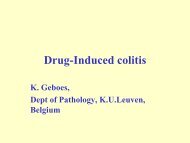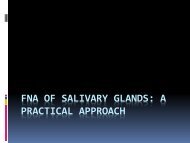LAP Overview. 24th Meeting of AD-IAP Khartoum, Sudan December ...
LAP Overview. 24th Meeting of AD-IAP Khartoum, Sudan December ...
LAP Overview. 24th Meeting of AD-IAP Khartoum, Sudan December ...
- No tags were found...
Create successful ePaper yourself
Turn your PDF publications into a flip-book with our unique Google optimized e-Paper software.
COLLEGE OF AMERICAN PATHOLOGISTS<br />
Laboratory Accreditation Program<br />
Introduction to CAP Lab Accreditation Program<br />
24 th <strong>Meeting</strong><br />
Arab Division<br />
International Academy <strong>of</strong> Pathology<br />
<strong>Khartoum</strong>, <strong>Sudan</strong><br />
<strong>December</strong> 6-8, 2012
Introduction<br />
To<br />
CAP Laboratory Accreditation Program<br />
Samir S Amr, MD, FCAP<br />
President<br />
International Academy <strong>of</strong> Pathology<br />
Chairman<br />
Department <strong>of</strong> Pathology and Laboratory Medicine<br />
King Fahad Specialist Hospital<br />
Dammam, Saudi Arabia<br />
Deputy Commissioner for the Middle East<br />
CAP Laboratory Accreditation Program
Mission Statement<br />
The College <strong>of</strong> American Pathologists, the leading<br />
organization <strong>of</strong> board-certified pathologists,<br />
serves patients, pathologists and the public by<br />
fostering and advocating excellence in the<br />
practice <strong>of</strong> pathology and laboratory medicine.
CAP Worldwide<br />
Committed to Excellence<br />
• The CAP is the provider <strong>of</strong> ALL components<br />
<strong>of</strong> quality management<br />
– Complete quality systems<br />
– Standard setting<br />
– Expert knowledge source<br />
– Comprehensive and integrated programs
Committed to Excellence<br />
• 630 expert pathologists<br />
and laboratory<br />
pr<strong>of</strong>essionals<br />
representing your<br />
interests on the technical<br />
resource committees.
Ensuring Quality Worldwide<br />
Through Collaboration<br />
• WASPaLM<br />
– World Association <strong>of</strong> Societies <strong>of</strong><br />
Pathology and Laboratory<br />
Medicine<br />
• ISO TC212 Working Groups<br />
– Quality Management<br />
– Reference Systems<br />
– In-Vitro Diagnostic Program<br />
– Anti-Microbial Susceptibility<br />
• National Quality Forum<br />
• CDC Institute for Quality and<br />
Laboratory Medicine<br />
• COWSA<br />
– Commission on World Standards<br />
and Accreditation<br />
• CLSI<br />
– Clinical and Laboratory<br />
Standards Institute
Ensuring Quality Worldwide<br />
Through Collaboration<br />
• Commission on Cancer (CoC)<br />
– Accepted CAP Cancer Protocols<br />
• American Society <strong>of</strong> Clinical Oncology (ASCO)<br />
– HER2 requirements & other predictive markers<br />
• United Network <strong>of</strong> Organ Sharing (UNOS)<br />
– Collaboration for organ donation programs<br />
• American Society <strong>of</strong> Reproductive Medicine (ASRM)<br />
– Co-sponsors reproductive accreditation program<br />
• Liaisons with specialty societies for PT (ACMG, AACC, FBR)<br />
• American Association <strong>of</strong> Blood Banks
Collaboration Improves Patient Care<br />
• Research showed a 50% response rate when Her2<br />
positive breast cancer was treated with Herceptin.<br />
• However, HER2 was running at a 25% false<br />
positive and the drug is highly cardiotoxic.<br />
• CAP partnered with ASCO to write HER2 clinical<br />
practice guidelines for the improvement <strong>of</strong> Her2<br />
accuracy.
CAP LABORATORY<br />
ACCREDITATION PROGRAM<br />
(<strong>LAP</strong>)<br />
Mission: To improve quality <strong>of</strong> laboratory<br />
services through peer review and education.
Why CAP Accreditation<br />
The Gold Standard<br />
• Established in 1961<br />
• Provides a solid foundation for ensuring<br />
excellence in patient safety and compliance<br />
• Top rated 100 US Hospitals with laboratories,<br />
97% CAP accredited<br />
• Over 7,000 laboratories accredited worldwide<br />
in 44 countries
Laboratory Accreditation Program<br />
Today<br />
• Over 7,000 Participating Laboratories<br />
• Ten to Twelve Inspections per Day<br />
• International Recognition and Participation<br />
– 260 international labs in 42 countries<br />
– Field teams with mixed language capabilities in<br />
Asia, Middle East, South America, India, Europe,<br />
Mexico and other
Laboratory Accreditation Program<br />
International Participation<br />
• North America: Canada, Mexico<br />
• South America: Argentina, Brazil<br />
• Europe: Cyprus, Germany, France, England,<br />
Scotland, Wales, Belgium, Switzerland, Spain, Italy,<br />
Turkey, Portugal, Lithuania<br />
• Middle East: Saudi Arabia, UAE (Dubai and Abu<br />
Dhabi), Lebanon, Kuwait, Jordan, Qatar, and Egypt.<br />
• Asia: China, Japan, Korea, Singapore, India
CAP Laboratory Accreditation<br />
• Widest spectrum <strong>of</strong> disciplines<br />
• Performance monitoring & pr<strong>of</strong>iciency testing results on a<br />
continuous basis<br />
• Accommodates all testing sites<br />
• Value <strong>of</strong> accreditation-based on continuous educational benefits<br />
• Ongoing quality monitoring and oversight online through e-LAB<br />
Solutions<br />
• CAP checklists provide a comprehensive and up-to-date blueprint<br />
<strong>of</strong> quality practices<br />
• Inspection teams comprised <strong>of</strong> pathologists and technologists
CAP Laboratory Accreditation<br />
Program Committees<br />
COUNCIL ON<br />
ACCREDITATION<br />
CONTINUOUS<br />
COMPLIANCE<br />
COMMITTEE<br />
ACCREDITATION<br />
COMMITTEE<br />
COMPLAINTS<br />
COMMITTEE<br />
INTERNATIONAL<br />
COMMITTEE<br />
CAP 15189<br />
COMMITTEE<br />
INSPECTION<br />
PROCESS<br />
COMMITTEE<br />
COMMISSION ON<br />
LABORATORY<br />
ACCREDITATION<br />
ACCREDITATION<br />
EDUCATION<br />
COMMITTEE<br />
CHECKLIST<br />
COMMITTEE<br />
14
Quality Impact from CAP Accreditation and<br />
Pr<strong>of</strong>iciency Testing<br />
15
Volume<br />
Continuous Compliance<br />
• All labs that participate in CAP required pr<strong>of</strong>iciency<br />
testing perform better over time<br />
CAP Clients, Unsatisfactory Pr<strong>of</strong>iciency Testing<br />
Time<br />
16
How does CAP ensure …<br />
Quality, Accuracy and Consistency<br />
17
Accreditation Education Activities<br />
• Seminars, audio conferences, and self-study materials improve<br />
the quality <strong>of</strong> laboratory testing and process management<br />
• Enhance the consistency and reliability <strong>of</strong> the inspection<br />
process<br />
• Improve inspection skills<br />
• Apply “best practices” to the laboratory<br />
• Keep you up to date with the most current Laboratory<br />
Accreditation Program changes<br />
• Share new inspection requirements for all laboratory sections<br />
18
CAP Worldwide Committed to<br />
Excellence<br />
• SURVEYS/Excel – Largest, most comprehensive external PT<br />
program in the world<br />
• > 800 Analytes, 23,000 laboratories, 85 countries<br />
• Anatomic Pathology Programs<br />
• PIP- Performance Improvement Programs for Surgical<br />
Pathology<br />
• Online Digital Slide Program for Surgical Pathology<br />
• PAP - Inter-laboratory Comparison for Gynecological and<br />
Non-gynecological Cytopathology<br />
• Neuropathology<br />
• Autopsy Pathology<br />
• HER2 Immunohistochemistry
Why Accreditation<br />
Participating in a Voluntary Laboratory<br />
Accreditation Program Improves the Quality<br />
<strong>of</strong> Services for Patients.
Laboratory Accreditation Program<br />
Philosophy<br />
• Voluntary<br />
• Quality<br />
• Peer Review<br />
• Education
Laboratory Accreditation Program<br />
Volunteers<br />
Inspections carried out by thousands <strong>of</strong><br />
trained, knowledgeable volunteer team<br />
leaders and members.
Laboratory Accreditation Program<br />
Focus on Quality<br />
• Consistent Inspection Process Through:<br />
– Inspection education seminars<br />
– Team leader/member selection<br />
– Checklist questions
Laboratory Accreditation Program<br />
Focus on Quality<br />
• General Clinical Disciplines<br />
• Specialty Disciplines<br />
– Anatomic Pathology<br />
– Cytopathology<br />
– Molecular Pathology<br />
– Histocompatibility<br />
– Cytogenetics
Laboratory Accreditation Program<br />
• What Is a Peer<br />
Peer Review<br />
– Equal standing (pathologist, technologist, etc.)<br />
– Laboratory pr<strong>of</strong>essional<br />
– First-hand knowledge<br />
– Offers constructive feedback
Laboratory Accreditation Program<br />
Peer Review<br />
• Peer Review<br />
• Pr<strong>of</strong>essional Inspectors with Specialty Expertise<br />
• Scientific Resources<br />
• New Technology<br />
• Ongoing Monitoring, Education<br />
and Improvement
Laboratory Accreditation Program<br />
Peer Review<br />
• Benefits <strong>of</strong> Being an Inspector:<br />
– Promotes the laboratory pr<strong>of</strong>ession to the public<br />
– Gains insight through interacting with peer<br />
pr<strong>of</strong>essionals<br />
– Obtains CME/CMLE credit
Laboratory Accreditation Program<br />
• Standard I - Director<br />
Standards<br />
• Standard II - Physical Facilities and Safety<br />
• Standard III - Quality Control and<br />
Performance Improvement<br />
• Standard IV - Inspection Requirements
Laboratory Accreditation Program<br />
Checklists<br />
• Laboratory General<br />
• Hematology<br />
• Clinical Chemistry<br />
• Urinalysis<br />
• Toxicology<br />
• Special Chemistry<br />
• Microbiology<br />
• Transfusion Medicine<br />
• Diagnostic Immunology<br />
• Anatomic Pathology<br />
• Cytopathology<br />
• Cytogenetics<br />
• Histocompatibility<br />
• Flow Cytometry<br />
• Molecular Pathology<br />
• Point <strong>of</strong> Care
Laboratory Accreditation Program<br />
Checklists - continued<br />
• Limited Service Laboratory<br />
• Blood Gas Laboratory
Laboratory Accreditation Program<br />
Checklists<br />
Checklists guide the inspection by assisting<br />
with the interpretation <strong>of</strong> <strong>LAP</strong> Standards
Laboratory Accreditation Program<br />
• Checklists<br />
Checklists<br />
– Help paint a complete picture <strong>of</strong> lab operations<br />
• Detail<br />
• Broad vantage point<br />
– Provide guidelines for development <strong>of</strong> policies,<br />
procedures and processes<br />
– Help ensure accurate, reliable test results
Laboratory Accreditation Program<br />
• Checklists are not…<br />
Checklists<br />
– A list to follow exclusively<br />
– A source <strong>of</strong> “Yes” or “No” interview questions<br />
– The <strong>of</strong>ficial report <strong>of</strong> inspection findings
Laboratory Accreditation Program<br />
Checklist Revisions<br />
• Over 3,200 Checklist Questions<br />
• Checklists are Revised to:<br />
– Incorporate new technology<br />
– Eliminate outdated technology<br />
– Allow for more appropriate technology
Laboratory Accreditation Program<br />
Checklist Development<br />
Resource Committees<br />
New<br />
Checklist<br />
Suggestions<br />
Commissioners
Laboratory Accreditation Program<br />
Checklist Development<br />
Modifications<br />
Labs<br />
Checklist<br />
Commissioner<br />
CAP Resource<br />
Committees<br />
Printing<br />
CMS<br />
Commission on<br />
Laboratory<br />
Accreditation
• Phase 1<br />
Laboratory Accreditation Program<br />
Deficiencies<br />
– Do not seriously affect patient care and safety/welfare<br />
<strong>of</strong> lab workers<br />
• Phase 2<br />
– May have a serious affect on patient care or may<br />
seriously affect safety/welfare <strong>of</strong> lab workers
Laboratory Accreditation Program<br />
Pr<strong>of</strong>iciency Testing<br />
An educational, peer comparison program<br />
designed to assess the state-<strong>of</strong>-the-art in<br />
areas <strong>of</strong> the medical laboratory and to<br />
promote improvement in patient care.
Laboratory Accreditation Program<br />
Pr<strong>of</strong>iciency Testing<br />
When no external PT is available, have a<br />
documented system for determining accuracy<br />
and reliability <strong>of</strong> test results.
Laboratory Accreditation Program<br />
Pre-Inspection<br />
• Laboratory Receives Application Packet<br />
• Review by Technical Staff<br />
• Documentation Review<br />
• Inspector Appointment<br />
• Inspection Packet Sent to Inspector
Laboratory Accreditation Program<br />
Pre-Inspection<br />
• Assigning a Team Leader<br />
– Like institution (size and scope)<br />
– Not competitors<br />
• Assigning Team Members<br />
– Own laboratory<br />
– Other laboratory<br />
– CAP database
Laboratory Accreditation Program<br />
Inspection<br />
• Begin with a Private Conference<br />
• Inspection Team Members Assigned to Areas<br />
<strong>of</strong> Laboratory<br />
• Review <strong>of</strong> Procedures, Manuals, etc.<br />
• Discussions with Lab Personnel<br />
• Discussion with Administrator, Chief <strong>of</strong><br />
Medical Staff
Laboratory Accreditation Program<br />
Laboratory General<br />
• Laboratory Safety<br />
• Physical Facilities<br />
• Personnel<br />
• Computer Services<br />
• Specimen Collection<br />
• QC/QA<br />
• External quality assessment (PT)
Laboratory Accreditation Program<br />
Quality Control<br />
• Written Procedure Manuals<br />
• Annual Review <strong>of</strong> Procedures<br />
• Laboratory Personnel Read Procedures<br />
• Defined Tolerance Limits<br />
• Recorded QC Runs and Instrument Function<br />
Checks
Laboratory Accreditation Program<br />
Quality Control<br />
• Mechanism to Detect Data Exceeding<br />
Tolerance Limits<br />
• Action for Out-<strong>of</strong>-Control Points<br />
• Periodic Review for Trends<br />
• Designation <strong>of</strong> Persons with Authority to<br />
Report Patient Results if Control Values Out<br />
<strong>of</strong> Acceptable Range
Laboratory Accreditation Program<br />
Quality Assurance<br />
• Ongoing Program to Identify Important<br />
Problems in Patient Care<br />
– Monitoring<br />
– Evaluation<br />
– Corrective actions<br />
• Documentation
Laboratory Accreditation Program<br />
• Pre-analytic<br />
Quality Assurance<br />
• Analytic<br />
• Post-analytic
Laboratory Accreditation Program<br />
• Summation Conference<br />
Inspection<br />
– Summary <strong>of</strong> deficiencies<br />
– Educational<br />
– Chance for laboratory to correct deficiencies
Laboratory Accreditation Program<br />
Post-Inspection<br />
• Labs Respond to Deficiencies<br />
• Review <strong>of</strong> Deficiencies<br />
– Technical Specialists<br />
– Regional Commissioners<br />
• Lab Receives Accreditation Letter<br />
• Appeal Process<br />
• Self-Evaluations
Laboratory Accreditation Program<br />
As a voluntary, peer review, educational<br />
program, the CAP Laboratory Accreditation<br />
Program serves as a quality improvement<br />
tool.
2003<br />
CAP forward<br />
application and<br />
checklists to the<br />
lab<br />
Lab submits<br />
an Application<br />
Request Form<br />
with deposit<br />
CAP<br />
Inspection<br />
Cycle<br />
Team<br />
conducts<br />
a thorough<br />
inspection<br />
using<br />
checklist<br />
As guides








